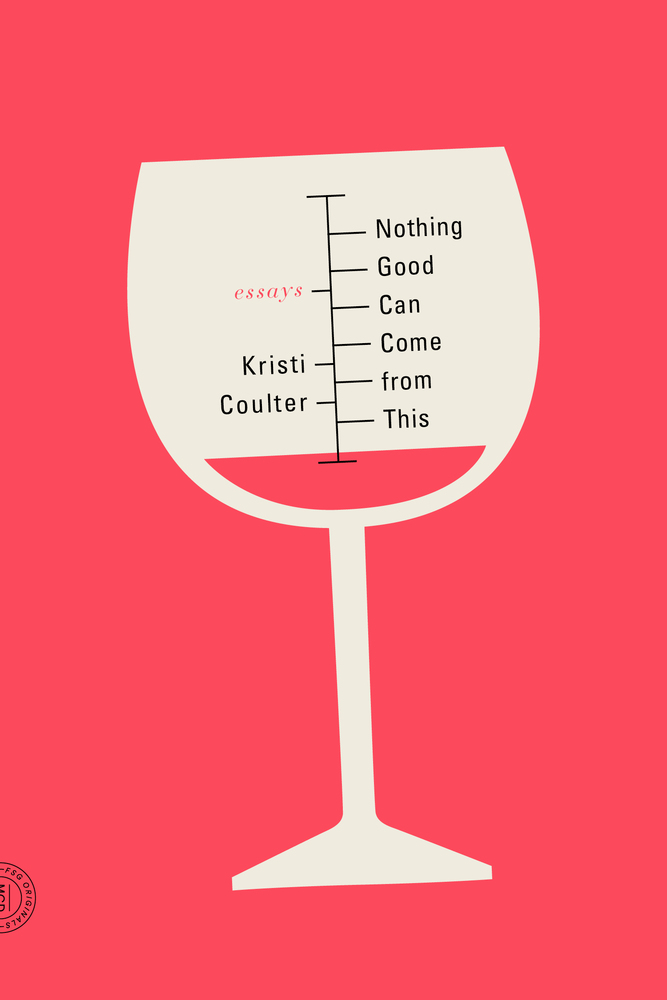
Writer Kat Read discusses drinking and the essay form in her review of Kristi Coulter’s collection Nothing Good Can Come from This.
I didn’t read Kristi Coulter’s essay “Enjoli” when it was first published in the summer of 2016. I didn’t read it that fall, when my first marriage was falling apart and I started mixing a jumbo negroni for myself every night after work. I didn’t read it in 2017, or in 2018 either, when I was living alone while my husband Will stayed in Canada processing his green card application, and I’d pour myself a cool refreshing gin and tonic at 12:01pm most Saturdays.
All those times, I probably should have read “Enjoli,” included in Nothing Good Can Come from This, because in the essay, Coulter recalls the ways drinking alcohol dulls the daily indignities (and even violence) that comes with the territory of living in a female body–or as she puts it, “Booze is the oil in our motors, the thing that keeps us purring when we should be making other kinds of noise.” I winced while reading it, thinking of the times I have walked into my apartment after a difficult day in the world and made myself a martini without even taking off my shoes.
Beyond “Enjoli,” Coulter’s sparkling collection contains twenty-two additional essays that are oriented around the theme of Coulter’s decision to stop drinking alcohol. One could argue that alcohol is the topic of every essay, but it really serves as the starting point through which Coulter shares her experiences with the reader. She dives deep into issues like body image, sex, and work, all the while surfacing back to her relationship with alcohol. Reading the collection as a whole, one begins to understand the monumentality of Coulter’s decision not to drink. The essays unfold in a harrowing and even joy-filled tumble, an accounting for the tendrils of alcohol use and abuse that wrapped themselves around different parts of her life.
By employing the form of an essay collection, Coulter doesn’t limit herself to one narrative arc; rather, she leads the reader down a number of interconnected paths, doubling back in time, examining and re-examining topics, all while deepening the reader’s understanding of her story. The result is an intensely compelling and cohesive journey through Coulter’s experience.
Moreover, Coulter is playful with the essay form itself. She has essays structured as quizzes (“Do You Have A Drinking Problem?”), Q&As (“How To Be A Moderate Drinker”), and poems (“Permission, After Mary Oliver”). Perhaps the most striking example of these is “A Life in Liquids,” in which Coulter breaks down her life into epochs of alcohol; “Jug Wine,” “Gin and Tonic” and “Some Kind of Punch;” and later, non-alcoholic indulgences like “Juniper Syrup and Soda,” “Lemon Custard Ice Cream,” and finally, “Sweat.”
Each section is studded with details. In the section “Long Island Iced Tea, 1986,” Coulter recounts the words of a bartender offering her the drink when she was in high school: “It has everything in it but doesn’t taste like any of it.” I shuddered when I read that line and the oblivion of taste and other senses it implied.
Though the subject matter is serious, Coulter’s prose glimmers with conversational wit. Her exasperation at the pitiful non-alcoholic options in restaurants is hysterical: “A smoothie is a meal!” she exclaims in “Desire Lines.” After a Botox treatment leaves her looking “less enraged” in “Shadow Life,” she “practiced some stern glares in the hotel room mirror” to ensure she can still frighten men if necessary. Over the course of several essays, she describes her passion for running; still, when she describes it as her “running career” in “Going Long,” she catches herself: “it’s more like a running internship.” Her writing has the kind of delightful and occasionally self-deprecating energy that makes me think, “I want this person to be my friend.”
In this collection of superb essays, the one that stuck with me the most was “Fascination.” In a subversion of the usual narrative arc of alcohol use leading to what she refers to as “extramarital trouble,” the married Coulter describes developing an intense emotional connection with an also-married coworker that began after she stopped drinking. She describes breathless conversations, intense gazes, and erotic dreams. Her language is clear and vibrant; of their weekly meetings at a café, she writes, “A better woman would have stopped wearing three-inch heels to coffee, but I had no interest in being a better woman.”
Eventually, the other man decided to step back before their friendship escalated into an affair. When she describes telling her husband about the relationship, it is with an ache that is palpable: she had fallen in love with this other man and remained deeply in love with her husband. The experience, though painful, had delivered her to a dazzling understanding: “A life where falling in love was impossible was not what I was going for.”
It made me think of my own marriage and the pain I have inflicted and experienced in order to build a life with Will. I thought of my divorce from my first husband, of the evenings I sat alone, numbing myself so I didn’t have to face the agony of wanting something different. And then I thought of the months I spent apart from Will, of the time I spent longing for him, waiting for my life to begin with my fingers wrapped around a glass. Reading Coulter’s words shifted my perception: she made me realize that the pain was a teacher, telling me not only what Will means to me, but also illustrating my own capacity for connecting to another human. This is Coulter’s achievement: she has used a series of essays, divergent yet interconnected, to triangulate around a series of deep truths:
There are things that are so precious that we cannot begin to measure their worth.
There are emotions that should not be dulled, no matter how painful.
And: how raw and beautiful it is just to feel.
_________________________
Bio: Kat Read is a writer and fundraiser at GrubStreet in Boston, MA. Her essays have appeared in the Brevity Blog and Coastin’. You can find her online at www.kataread.com and on Twitter @KatARead.


